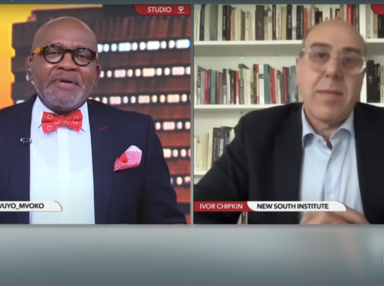Forbes Africa Spotlights NSI’s Ivor Chipkin’s Take on South Africa’s Complex BRICS Summit Scenario
In a recent interview with Forbes Africa, Ivor Chipkin, executive director of Johannesburg-based think tank the New South Institute (NSI), weighed in on South Africa’s current predicament as it prepares to host the upcoming BRICS (Brazil, Russia, India, China and South Africa) summit. With tensions rising on several fronts – involving Russia, the US and the International Criminal Court (ICC) – Chipkin offered insights into the complex geopolitical challenges that lie ahead.
The possible presence at the summit of the President of the Russian Federation, Vladimir Putin, who is subject to an ICC arrest warrant, complicates matters for the South African government. As a signatory to the Rome Statute, South Africa is obliged to abide by the decisions of the ICC, raising the question of how the country might respond if President Putin chooses to attend the event.
South Africa’s historical relationship with Russia, largely due to the latter’s support for the African National Congress (ANC) during the apartheid era, adds another layer of complexity to the situation. As Chipkin explains, the relationship, based on shared opposition to Western hegemony, mutual economic interests and aligned positions on global issues, currently puts South Africa in an “awkward position”.
This ambiguity has not gone unnoticed. Several senior government ministers and the commander of the military’s ground forces have visited Russia in recent months, while President Cyril Ramaphosa has held talks with China’s President Xi Jinping. At the same time, the ANC is reportedly discussing possible changes to the venue of the summit with China, further evidence of the intense diplomatic activity underway.
Chipkin raises valid questions about South Africa’s position, calling it “puzzling” and highlighting the complexities it adds to an already tense global stage. However, the undercurrent of his analysis makes clear the need for the country to carefully navigate its next steps. The resolution of these issues could have a significant impact on South Africa’s standing in international affairs and its economic health, underscoring the critical role that strategic diplomatic manoeuvring plays in such high-stakes situations.
Against this backdrop, South Africa finds itself at a critical juncture, where decisions made in the coming weeks could reverberate far beyond its borders and have a profound impact on the country’s global standing and economy. As a leading voice in public policy discourse, the New South Institute remains at the forefront of these discussions, contributing in-depth analysis and expert perspectives to the ongoing debate.



